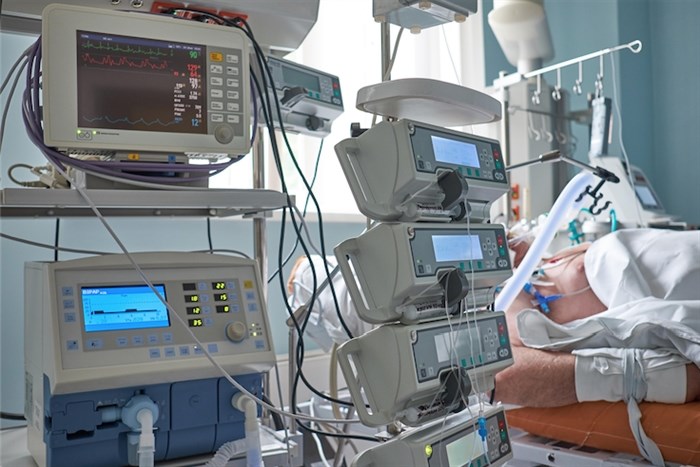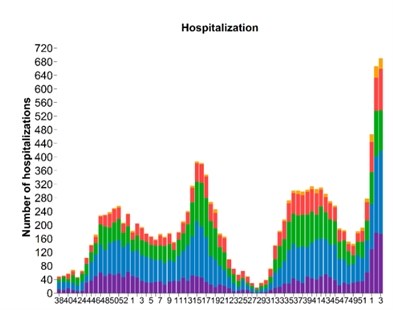
Image Credit: ADOBE STOCK
February 12, 2022 - 6:00 AM
If you’re wondering why B.C. isn’t following Saskatchewan and Alberta in ending pandemic measures, you need look no farther than your local hospitals.
Kelowna General Hospital was at 115% capacity last week with 19% of its beds occupied by people who tested positive for COVID-19.
Royal Inland Hospital was at 100% capacity with 10.4% of its 259 beds occupied by people with positive COVID tests, according to information provided to iNFOnews.ca in an email from Interior Health.
This pattern of strain on Interior health care facilities is what provincial health officer Dr. Bonnie Henry predicted during a Jan. 14 news briefing.
At that time, she said the peak of Omicron infections hit B.C. a week earlier but that the peak in hospitalizations was yet to come.
“We are still at point where our hospitalization rate is going up so hospitalizations are still a concern,” she said during a news briefing. “Once you see the peak of transmission in the community, there’s a lag of about a week before you see the peak of new admissions to hospital. Then there’s a lag of about another week before we see a decrease in hospital census (total number of cases).”
At that time, she expected the peak of new admissions to hospital to be sometime from Jan. 15 to 22. Even at the latest date, that would have seen the number of people in hospital with COVID start to decline at the end of January. But still it hasn’t eased the strain much.
Dr. Henry also said that Omicron hit the Lower Mainland and Vancouver Island first so it will take longer to more through the Interior health regions.
An Interior Health website shows Kelowna General Hospital with 440 beds, 31 of which are intensive care.
Last week, 85 beds were occupied by people with COVID. That’s dropped below 70 this week with seven people in intensive care beds, meaning 23% of intensive care bed users have COVID.
Health authorities count anyone in hospital who has a positive COVID test as a COVID patient, even though about 50% may be there for other reasons and just happened to test positive while there.
In Kamloops, there are 259 beds, with 21 being used for intensive care. Its COVID-affected beds grew from 20 last week to 27 this week, according to the Interior Health email. That’s a rate of 10.4% being COVID.
The email does not say how many of the Kamloops patients with COVID are in intensive care. It has 21 intensive care beds.
READ MORE: Omicron on downward trajectory in B.C. but not in Interior Health yet
So far, the record number of people in hospital in B.C. with COVID was 1,048 on Jan. 31, just a couple of days later than expected.
But, the question remains, was that the peak?
That number did slowly fall to 946 by last Friday but climbed back up to 987 over the weekend, although the numbers have fallen a bit more this week.

This is a graph of COVID hospitalizations by age group from Sept 13, 2020 (week 38) to Jan 22, 2022 (week 3). Red are those aged 20-39, green is 40-59, blue is 60-79 and purple is over 80.
Image Credit: Submitted/B.C. Centre for Disease Control
Regardless of the daily fluctuation in case counts and hospitalization numbers, the reality is that the number of people in B.C. hospitals with COVID is extremely high at a time when health care workers are also falling victim to the disease or pushed out of the hospitals.
To put that in perspective, on April 28, 2021, during the third wave of COVID, hospitalizations peaked at 515.
By July 17, they fell to their lowest level in months to 43.
The Delta wave created the next peak in hospitalizations with 445 recorded on Nov. 2.
By Dec. 7, when the first Omicron cases were discovered in B.C., there were 242 people in hospital with COVID.
While Omicron is considered much less harmful than Delta, coupled with the fact that vaccinations make it less potent, that didn’t stop the sheer numbers of infections from pushing up hospitalization rates.
The climb up was gradual through December with a new record of 534 cases recorded on Jan. 13.
The next day, Dr. Henry changed the way COVID cases in hospitals were recorded so that number jumped by 100 overnight.
Still, it only took 18 days for those 500 cases to double to more than 1,000 by the end of January and remain near that level until now.
It must be noted that about half those cases are people who were in hospital for other reasons and tested positive for COVID while in hospital. Even so, the number of people in hospital now is 25 times higher than it was in the summer.
Another measure of the severity of this disease is the number of people sick enough with COVID to require intensive care treatment.
That peak came on April 29 when 178 people with COVID were in intensive care. That fell to as low as 12 in the summer and grew to 82 by Dec. 7. That was at the height of the Delta wave and the day Omicron was found in B.C.
Today, Feb. 10, there are 138 intensive care patients in B.C. with COVID.
Of those, 25 (18%) were in Interior Health region intensive care units. There were 181 people in Interior Health's hospitals, or 21% of B.C.'s total. Interior Health has about 14% of the province’s residents.
READ MORE: Interior Health lagging behind Lower Mainland in the fight against Omicron
To put more context around these numbers, there are 9,229 base hospital beds in B.C. so, right now, about 9% are occupied by people with COVID.
There are 510 base intensive care beds, so about 27% are occupied by COVID patients.
“This tells us that we need to keep doing what we’re doing right now and it’s going to be a challenging few weeks on our hospitals,” Dr. Henry said back on Jan. 14.
Those challenging weeks are still here. Dr. Henry has said she won’t announce any changes to COVID restrictions before, at least, Feb. 15.
To contact a reporter for this story, email Rob Munro or call 250-808-0143 or email the editor. You can also submit photos, videos or news tips to the newsroom and be entered to win a monthly prize draw.
We welcome your comments and opinions on our stories but play nice. We won't censor or delete comments unless they contain off-topic statements or links, unnecessary vulgarity, false facts, spam or obviously fake profiles. If you have any concerns about what you see in comments, email the editor in the link above.
News from © iNFOnews, 2022